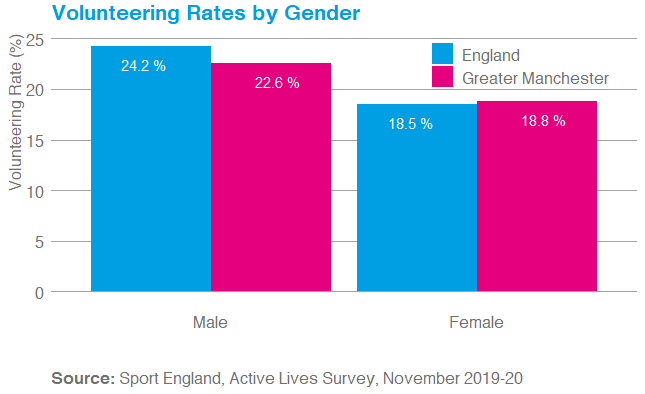Greater Manchester Volunteering levels Nov 19-20
The Active Lives results published by Sport England show that 20.7% of adults volunteered at least once in the last year.
The latest Active Lives data shows that in Greater Manchester (GM) 20.7% of adults have volunteered to support sport and physical activity at least once in the past year, this compares to 21.3% nationally. These roles range from coaching to fundraising to admin support and all support in providing opportunities for others to be active.
Due to changes in the survey and questions on volunteering it is not possible to compare data from this release to previous data sets.
Demographics
Gender

Volunteering is more common amongst men both nationally and in Greater Manchester. Whilst men are more likely to volunteer than women the rate of male volunteering is lower in GM than seen nationally (22.6% v 24.2%) and combined with above average volunteering rates for women the gender volunteering gap is smaller in GM, 3.8%, than nationally, 5.7%.
Age

Whilst nationally volunteering to support sport and physical activity declines with age the pattern is not as clear in Greater Manchester. 35 to 54 year olds are the most likely to volunteer (23.7%) followed by over 75’s (22.4%); the volunteering rate amongst over 75’s is considerably higher in GM than it is nationally (22.4% v 17.3%).
Disability

Volunteering rates are lower amongst those with a long term limiting disability, however, Greater Manchester does see an above average rate of volunteering amongst this cohort (17.2% v 16.4%). This, and lower than average volunteering rates for those with no long term limiting disability, means that GM has a smaller disability volunteering gap than seen nationally (4.7% v 6.3%).
Ethnicity

Volunteering rates vary considerably across different ethnic groups. In Greater Manchester those from a Black background are the most likely to volunteer with a quarter having volunteered at least once in the past year. The lowest rates of volunteering were seen amongst those identifying as White Other where 17.1% had volunteered at least once in the past year, however, this is above the national average for this cohort.
Socio-economic status

There is a clear relationship between socio-economic status and volunteering; those from higher socio-economic groups are more likely to volunteer and this pattern is seen both nationally and in Greater Manchester.
